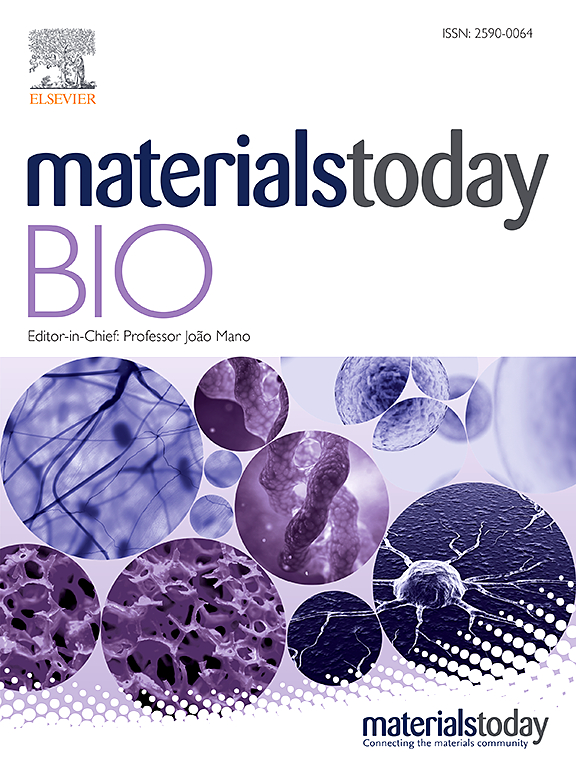Microneedle-based sustained release delivery of TNF-α/IL-6R dual-specific fenobody alleviates inflammation and promotes bone regeneration in rheumatoid arthritis rat model
IF 8.7
1区 医学
Q1 ENGINEERING, BIOMEDICAL
引用次数: 0
Abstract
Rheumatoid arthritis (RA) is a chronic, systemic autoimmune disease characterized by inflammatory imbalance. The cytokine-targeted therapy is a non-traditional form of RA treatment that is mighty effective but poses the challenge of pharmaceutical storage conditions, professional injection, frequent injection administrations and poor patient adherence, and due to individual differences in sensitivity to TNF-α and IL-6R, monotherapy with a single antibody is effective in fewer than 30 % of cases. Hence, to address these issues, we have developed a macromolecule polymer GelMA microneedle sustained-release platform for transdermal delivery of a dual-specific fenobody targeting TNF-α and IL-6R in an arthritic rat model. The results demonstrated that the IL-6R-TNF-α-fenobody exhibited enhanced specificity and affinity and an extended half-life. IL-6R-TNF-α-fenobody effectively neutralizes rhTNF-α-induced cytotoxicity in L929 cells, while inhibiting the phosphorylation of IκBα and p65 in the classical NF-κB signaling pathway, and significantly blocks JAK-dependent phosphorylation of STAT3, thereby exerting its anti-inflammatory effects via multiple signaling pathways. The GelMA hydrogel microneedle sustained-release platform facilitates controlled cargo delivery to alleviate the inflammatory environment and reduce over-activated synoviocyte activity, thus promoting bone and joint regeneration. In collagen-induced arthritis (CIA) rats, cross-linked gelatin microneedles demonstrated high mechanical strength, facilitating the effective delivery of fenobodies to the dermis for optimal microcirculation, reduced levels of inflammatory factors, this strategy significantly inhibited the progression of RA. Overall, the IL-6R-TNF-α-Fenobody therapy promoted bone and joint regeneration by synergistic inflammation-resolving, osteogenesis. Excitingly, the microneedle group showed comparable treatment outcomes to the injection group, providing a portable, painless, sustained-release alternative that could enhance patient compliance by reducing the need for frequent professional injections.
微针缓释给药TNF-α/IL-6R双特异性非体减轻类风湿关节炎大鼠模型炎症,促进骨再生
类风湿性关节炎(RA)是一种以炎症失衡为特征的慢性系统性自身免疫性疾病。细胞因子靶向治疗是一种非传统的RA治疗形式,具有强大的疗效,但存在药物储存条件、专业注射、频繁注射和患者依从性差的挑战,并且由于对TNF-α和IL-6R的敏感性存在个体差异,单一抗体单药治疗的有效性不足30%。因此,为了解决这些问题,我们开发了一种高分子聚合物GelMA微针缓释平台,用于在关节炎大鼠模型中经皮递送双重特异性非体,靶向TNF-α和IL-6R。结果表明,IL-6R-TNF-α-非体的特异性和亲和力增强,半衰期延长。IL-6R-TNF-α-非体有效中和rhTNF-α-诱导的L929细胞毒性,同时抑制经典NF-κB信号通路中i -κB α和p65的磷酸化,并显著阻断jak依赖性的STAT3磷酸化,从而通过多种信号通路发挥抗炎作用。GelMA水凝胶微针缓释平台有助于控制货物递送,减轻炎症环境,减少过度激活的滑膜细胞活性,从而促进骨和关节再生。在胶原诱导关节炎(CIA)大鼠中,交联明胶微针显示出高机械强度,促进抗体有效递送到真皮,实现最佳微循环,降低炎症因子水平,该策略显著抑制RA的进展。总体而言,IL-6R-TNF-α-非体治疗通过协同消炎、成骨促进骨和关节再生。令人兴奋的是,微针组显示出与注射组相当的治疗结果,提供了一种便携式、无痛、缓释的替代方案,可以通过减少频繁的专业注射来提高患者的依从性。
本文章由计算机程序翻译,如有差异,请以英文原文为准。
求助全文
约1分钟内获得全文
求助全文
来源期刊

Materials Today Bio
Multiple-
CiteScore
8.30
自引率
4.90%
发文量
303
审稿时长
30 days
期刊介绍:
Materials Today Bio is a multidisciplinary journal that specializes in the intersection between biology and materials science, chemistry, physics, engineering, and medicine. It covers various aspects such as the design and assembly of new structures, their interaction with biological systems, functionalization, bioimaging, therapies, and diagnostics in healthcare. The journal aims to showcase the most significant advancements and discoveries in this field. As part of the Materials Today family, Materials Today Bio provides rigorous peer review, quick decision-making, and high visibility for authors. It is indexed in Scopus, PubMed Central, Emerging Sources, Citation Index (ESCI), and Directory of Open Access Journals (DOAJ).
 求助内容:
求助内容: 应助结果提醒方式:
应助结果提醒方式:


